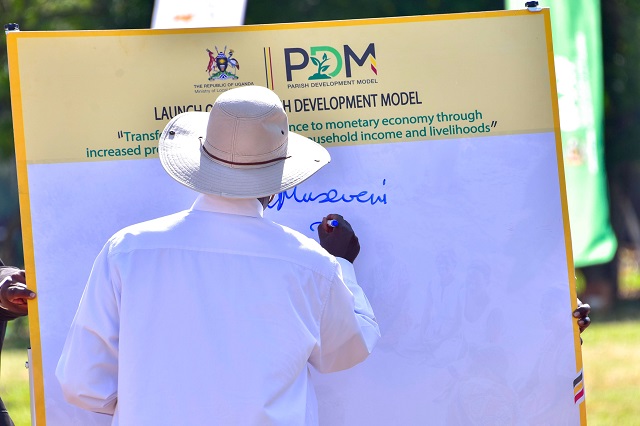Uganda’s Parish Development Model (PDM), launched in 2021, aims to transform the economy and improve the living standards of Ugandans, particularly those in rural areas, boosting local economic growth, the PDM strives to create wealth and improve access to essential services, including health, education, and food security.
During festive periods like Christmas, healthy eating becomes a vital component of maintaining good health and well-being. This model has significantly impacted the food systems in Uganda, leading to improvements in healthy eating during Christmas and beyond.
Understanding the Parish Development Model (PDM)
The PDM is a strategic government initiative aimed at enhancing the economic development of Uganda’s rural areas. It targets 10,594 parishes across the country, with the goal of lifting people out of poverty by focusing on improving livelihoods, especially in agriculture, health, and education. The model emphasizes local development through a bottom-up approach, encouraging community participation, creating local economic opportunities, and improving social services. It encourages people to engage in productive activities, increase household incomes, and improve access to resources that contribute to healthy living.
The PDM’s main focus areas include improving food security, supporting small-scale farmers, enhancing agricultural productivity, and increasing access to markets for locally grown produce. This, in turn, fosters healthier diets and nutrition, particularly during critical periods such as Christmas when food consumption is high, and traditional meals are a central part of the celebrations.
How the PDM Contributes to Healthy Eating During Christmas
- Promotion of Local Food Production
One of the PDM’s core objectives is to enhance local food production by encouraging smallholder farmers to increase agricultural productivity. This initiative is crucial during Christmas, a time when Ugandans typically prepare large meals for family and friends. The increased availability of locally grown fruits, vegetables, grains, and proteins means that people can incorporate fresh, nutritious, and locally sourced ingredients into their festive meals. This supports the consumption of a variety of food groups, ensuring a balanced diet during the holiday season.
Additionally, local food production promotes sustainable farming practices, reducing the reliance on imported foodstuffs. This not only helps improve the quality of the food consumed but also contributes to Uganda’s food sovereignty, making the country less dependent on global food markets, which can sometimes be unreliable or expensive during high-demand periods like Christmas.
- Increased Access to Nutritious Foods
As part of the PDM, there has been a concerted effort to increase access to nutritious food, especially in remote areas. The model promotes the cultivation of nutrient-rich crops like beans, peas, sweet potatoes, millet, cassava, and fruits, which are essential for healthy eating. These foods are not only affordable but also packed with essential vitamins, minerals, and fibre, contributing to better health outcomes for the population.
During Christmas, Ugandans are going to enjoy meals that feature locally grown and nutritious foods. For example, fruits like oranges, mangoes, and pineapples become more abundant, making it easier for families to incorporate healthy snacks and fruits into their meals. Moreover, communities have grown traditional vegetables such as amaranth, nakati (African eggplant), and spinach, which are rich in nutrients and often form part of the traditional Christmas feast.
- Improved Nutrition Awareness and Education
The PDM also includes educational campaigns about healthy eating, nutrition, and food safety. Through partnerships with local governments, health professionals, and community leaders, the initiative seeks to raise awareness about the importance of balanced diets, proper food handling, and the dangers of overindulgence during festive periods like Christmas. Such campaigns are crucial, as the Christmas season often leads to overeating, particularly of foods high in sugar, fats, and salt.
Educating people about the importance of moderating their consumption of unhealthy foods, promoting the benefits of consuming a variety of foods, and encouraging the inclusion of fruits, vegetables, and whole grains in their Christmas meals, the PDM supports healthier eating practices. Moreover, it advocates for the reduction of food wastage, encouraging families to prepare meals in moderation and preserve leftovers, which can be eaten after the holidays.
- Support for Small-Scale Farmers and Value Chain Development
The PDM has prioritized the support of smallholder farmers and the development of agricultural value chains. Farmers are provided with access to affordable inputs such as seeds, fertilizers, and equipment. This support leads to increased yields and better-quality produce, ensuring that nutritious foods are more readily available and affordable to local communities. This is particularly important during Christmas when the demand for food spikes.
Moreover, the PDM emphasizes strengthening local food markets and supply chains. By improving infrastructure like roads, storage facilities, and transportation networks, farmers can more easily get their products to market, thus making fresh produce available to consumers. This accessibility is key to ensuring that families can purchase and prepare healthy meals during the Christmas season.
- Sustainable Farming Practices
The PDM encourages sustainable agricultural practices, including the use of organic farming methods, agroforestry, and conservation agriculture. These practices ensure that food is grown in an environmentally responsible way, preserving soil health and reducing the impact of farming on the environment. Sustainable farming methods lead to the production of healthier foods without the use of harmful chemicals or pesticides, ensuring that what people eat during Christmas and beyond is safe and nutritious.
In addition, sustainable farming practices are more likely to contribute to long-term food security. As the population grows, the demand for food will continue to increase. By ensuring that farming practices are sustainable, Uganda can continue to meet its food needs, especially during periods of high demand, such as Christmas.
- Cultural Relevance and Traditional Foods
The PDM also emphasizes the importance of cultural preservation, encouraging Ugandans to embrace their traditional diets. During Christmas, many Ugandans continue to celebrate with indigenous dishes that form part of their cultural identity. The model supports the promotion of indigenous crops such as millet, sorghum, and cassava, which are important for healthy eating and are integral to traditional Christmas meals.
Incorporating these indigenous foods into festive meals not only enhances the health of the population but also helps preserve the cultural heritage of Uganda. The PDM supports the idea that healthy eating should align with local customs and practices, making it easier for people to maintain their health while also enjoying their cultural traditions.
Therefore
The Parish Development Model has played a crucial role in improving healthy eating among Ugandans, particularly during Christmas. Focusing on increasing local food production, enhancing access to nutritious foods, promoting health education, and supporting small-scale farmers, the PDM has made significant strides in addressing food security and nutrition. As Uganda continues to implement the PDM, the impact on healthy eating during the Christmas season is likely to grow, resulting in healthier diets, improved health outcomes, and a more sustainable food system for future generations.
Kamara Daniel- Nutritionist, @NutritionistKD – Bwindi Community Hospital





















This is a brilliant article from the expert. Good observation from the PDM works